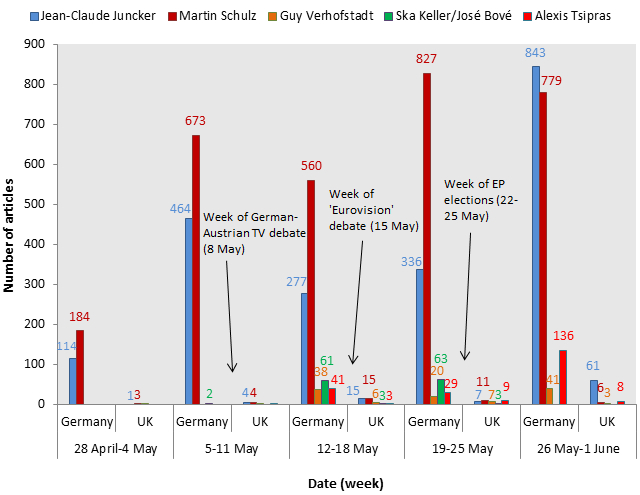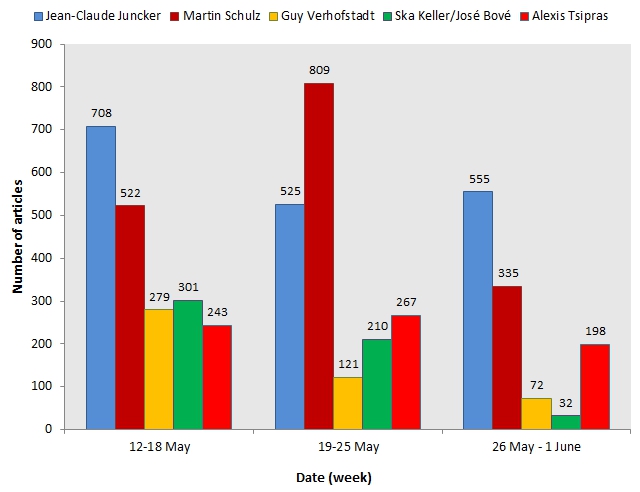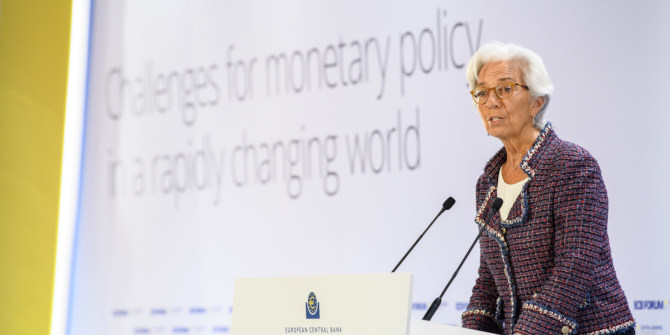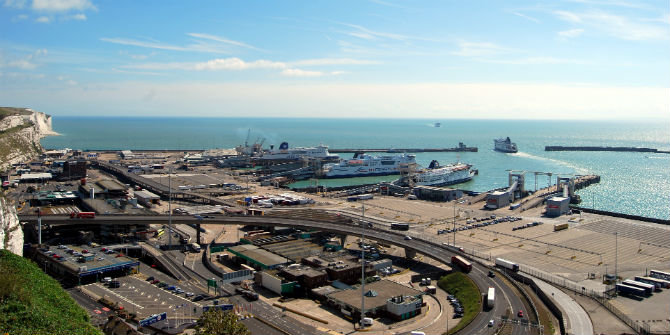
 The proposal of candidates for President of the European Commission prior to the 2014 European Parliament elections was criticised by the British government on the grounds that it did not fully engage European citizens. Miguel Otero-Iglesias and Kristina Lani assess the coverage of the process in the Spanish media, illustrating that the candidates received just as much attention in Spain as they did in Germany. They also note that Spanish public opinion on the use of Commission candidates grew more positive during the campaign, suggesting that media coverage may have played a role in enhancing support for the process.
The proposal of candidates for President of the European Commission prior to the 2014 European Parliament elections was criticised by the British government on the grounds that it did not fully engage European citizens. Miguel Otero-Iglesias and Kristina Lani assess the coverage of the process in the Spanish media, illustrating that the candidates received just as much attention in Spain as they did in Germany. They also note that Spanish public opinion on the use of Commission candidates grew more positive during the campaign, suggesting that media coverage may have played a role in enhancing support for the process.
While European Parliament (EP) elections have traditionally been conceived of as second-order elections in which national campaigns focus mostly on domestic affairs rather than on European issues, the recent 2014 EP elections were slightly different. For the first time, the main pro-European EP families (the centre-right, socialists, liberals, greens and the left) proposed a Spitzenkandidat (lead candidate) to become the President of the European Commission (EC), thus allowing European citizens to choose the head of the EC in a more direct way. But how different were these elections in different EU member states?
In a previous EUROPP article, Simon Hix and Stuart Wilks-Heeg analysed media coverage of the main candidates for the EC presidency in Germany and the UK. Their analysis concludes that the extensive presence of these Spitzenkandidaten in the German press relative to the British press (see Chart 1 below) explains why the German political elite and public at large were more in favour of electing Jean-Claude Juncker (the lead candidate of the European People’s Party, the EP group that gathered more seats) as the next president of the Commission than their British counterparts.
Chart 1: Number of articles in German and UK press citing each candidate for EU Commission President by name, weekly from 28 April 2014
Note: Chart compiled by Simon Hix and Stuart Wilks-Heeg. Derived from Library Press Display searches.
Inspired by the work of Hix and Wilks-Heeg, we have used the same methodology and analysed the coverage in the Spanish press via the database Factiva (shown in Chart 2 below). The Chart shows the number of mentions during the two weeks leading to the elections and the week after of Jean-Claude Juncker, the candidate for the European People’s Party; Martin Schulz, the candidate for the Party of European Socialists; Guy Verhofstadt, the candidate for the Alliance of Liberals and Democrats for Europe; José Bové and Ska Keller, the candidates for the Greens-European Free Alliance; and Alexis Tsipras of the Party of the European Left.
Chart 2: Number of articles in Spanish press citing each candidate for EU Commission President by name, weekly from 12 May 2014
Note: Compiled by the authors using the Factiva database.
As can be observed, the frequency of coverage was relatively high, especially for the two main candidates, Juncker and Schulz. This shows that the Spitzenkandidaten campaign was as much present in Spain as it was in Germany and far more visible than in the UK. Coverage was highest for Juncker in the week before the elections, for Schulz in the week of the elections (as was the case in Germany), and again for Juncker in the week after the elections. However, Juncker received much more coverage in the Spanish press than in the German press in the week before the week of the elections, possibly because, the week earlier, he had directly commented on Spain and its economic crisis, as well as on how he would deal with separatist movements such as in Scotland and Catalonia.
It is also interesting to note that the coverage of all the candidates reached its peak in Spain in the week of the elections, and lowered slightly in the following week, whereas in Germany, coverage skyrocketed for Juncker in the week after the elections, due to the intense debate with the UK on whether Juncker should become President of the EC. In Spain, by contrast, interest remained constant, presumably because the fight around the election of Juncker involved mostly the German Chancellor Angela Merkel, and the British Prime Minister, David Cameron, while the Spanish President, Mariano Rajoy, was not involved in these discussions.
However, what is clear from these results is that, in contrast to the widely assumed belief – especially among British politicians and pundits (perhaps because they use the media coverage in the UK as their reference) – that Juncker and Schulz were total unknowns outside Germany, this does not seem to be the case among the newspaper-informed Spanish public. It would be interesting to know how the press in other EU countries covered the Spitzenkandidaten, but the Spanish results show that the UK, and not Germany, might be the exception rather than the rule.
What is also interesting from our results is that, in Spain, some lead candidates have received substantially more coverage than in Germany, namely, Alexis Tsipras. This can be explained by the rise of Podemos, a left-leaning, anti-establishment party led by the media-savvy Pablo Iglesias, which finds its origin in the indignados movement, and which has become the fourth political force, gaining five seats in the 2014-19 European Parliament. Although Podemos ran as a non-inscribed party, during the campaign it was closely linked to Alexis Tsipras’ SYRIZA party in Greece, which would explain the high coverage of this candidate in the Spanish press. To this we have to add that Tsipras is a well- known figure in Spain since the Greek crisis in 2012.
Incidentally, as expected, Podemos has eventually joined the European United Left/Nordic Green Left group in the EP. Nevertheless, it must be mentioned here that, unlike the Front National in France or UKIP in Britain, Podemos, is not an anti-EU party in itself, but instead, a radical left force whose main declared goal would be to further democratise both the Spanish and the European political system. A more transparent and democratic EU is an aspiration of a great majority of European voters, both on the right and the left. This is why the Spitzenkandidaten campaign was more successful than was previously thought, especially in the UK.
This should not have come as a surprise. The latest autumn 2013 Eurobarometer results show that 57 per cent of Europeans were in favour of the EP groups presenting a lead candidate for the EC presidency. The proposal was supported by absolute majorities in 26 of the 28 EU member states. The only two countries where this was not the case were France and the UK, precisely the two countries were the Eurosceptic vote has risen the most.
Paradoxically, in Spain the Spitzenkandidaten logic gained momentum as the elections drew closer. In the spring 2013 Eurobarometer only 43 per cent of Spaniards backed the idea of having lead candidates. In autumn 2013, this figure increased to 52 per cent. Possibly the increased coverage in the media has helped inform people and enhance support. Perhaps the same could have happened in France and the UK if their media had increased their coverage.
Please read our comments policy before commenting.
Note: This article gives the views of the authors, and not the position of EUROPP – European Politics and Policy, nor of the London School of Economics. Feature image credit: vrelmunde (CC-BY-SA-3.0)
Shortened URL for this post: http://bit.ly/1lqP4E8
_________________________________
 Miguel Otero-Iglesias – Elcano Royal Institute
Miguel Otero-Iglesias – Elcano Royal Institute
Miguel Otero-Iglesias is Senior Analyst at the Elcano Royal Institute.
 Kristina Lani – Elcano Royal Institute
Kristina Lani – Elcano Royal Institute
Kristina Lani is an intern at the Elcano Royal Institute during the summer of 2014.






